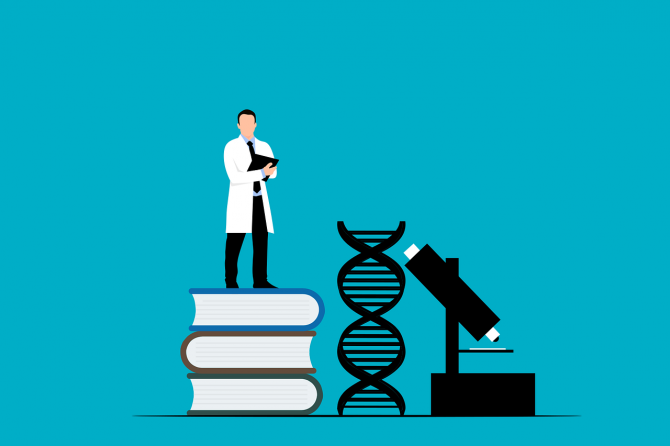
Autoimmune Disease vs Immunodeficiency
The key difference between autoimmune disease and immunocompromised is that an autoimmune disease occurs when the immune system erroneously attacks the normal healthy cells in the body, while immunocompromised occurs when the immune system fails to respond to an infection or disease adequately.
The immune system is a biological network of processes that protects people from diseases. It detects and responds to pathogens such as bacteria, fungi, and viruses. The immune system is mainly categorized into two systems as the innate immune system and the adaptive immune system. Nearly all organisms have some kind of an immune system. Autoimmune disease and immunocompromised are two conditions caused due to defects in the immune system.
What is Autoimmune Disease?
An autoimmune disease is a condition that occurs when the immune system mistakenly attacks the normal healthy cells in the body. The immune system usually guards against germs like bacteria, fungi, and viruses, etc. When it detects these foreign invaders, it sends out specific cells to attack pathogens. Usually, the immune system can figure out the difference between foreign cells and their own cells. In an autoimmune disease, the immune system mistakenly attacks parts of the body like joints or skin by detecting them as foreign. Moreover, it releases autoantibodies to attack healthy cells.
No one knows the exact cause of autoimmune disease. Women (6.4%) tend to suffer from this condition more than men (2.7%). For women, this condition starts in their child-bearing years in life (age 15 to 44). Some autoimmune diseases are peculiar to some ethnic groups. For instance, lupus affects more African–American and Hispanic people than Caucasians. Moreover, certain autoimmune diseases such as multiple sclerosis and lupus run in the family. Though every family member does not necessarily have the same disease, they inherit a susceptibility to the autoimmune condition.
Examples of Autoimmune Disease
Some common examples of autoimmune diseases are
- Celiac disease
- Diabetes mellitus type1
- Inflammatory bowel disease (IBD)
- Graves’ disease
- Psoriasis
- Multiple sclerosis
- Rheumatoid arthritis and Systemic lupus erythematosus
Furthermore, the treatment depends on the type and severity of the condition. Nonsteroidal anti-inflammatory drugs, immunosuppressants, and intravenous immunoglobulin may improve the condition. But they don’t typically cure the disease.
What is Immunocompromised?
Immunocompromised is a condition that occurs when the immune system fails to respond to an infection or disease adequately. It is a state in which the ability of the immune system to fight infections and diseases like cancer is compromised or entirely absent. Most diseases due to immunocompromising are acquired due to extrinsic factors such as HIV infection, environmental factors, nutrition, etc. Immunocompromised individuals are vulnerable to opportunistic infections. Furthermore, they also have reduced cancer immunosurveillance systems.
In clinical settings, immunosuppression is caused by some drugs, such as steroids used in various treatments. For example, organ transplant patients and patients who have overactive immune systems are subject to immunosuppression. Furthermore, immunoglobulin replacement therapy is the most popular treatment for this condition.
Immunocompromised Conditions
Based on the affected component of the body, the immunocompromised condition divides into different types like humoral immunodeficiency, T cells deficiency, asplenia, and complement deficiency. Moreover, it can be categorized into primary and secondary based on whether the cause originates in the immune system itself or it is due to insufficiency of a supporting component.
What are the Similarities Between Autoimmune Disease and Immunocompromised?
- These conditions occur due to defects in the immune system.
- Both conditions depend on the activity of immune cells.
- They cause severe diseases.
- Both can be due to genetic mutations.
- They are treatable.
What is the Difference Between Autoimmune Disease and Immunocompromised?
An autoimmune disease is a condition that occurs when the immune system mistakenly attacks the normal healthy cells in the body. Immunocompromised is a condition that occurs when the immune system fails to respond to an infection or disease adequately. So, this is the key difference between autoimmune disease and immunocompromised. Moreover, autoimmune disease is a condition due to a hyperactive immune system. In contrast, immunocompromised is a condition due to an underactive immune system.
The immune response is how the body recognizes and defends itself against pathogens such as bacteria, fungi, viruses, and substances that appear foreign. The immune system protects the human body from possible pathogens and harmful foreign substances by recognizing them accurately. Immune system disorders occur due to defects in the immune system. Autoimmune disease and immunocompromised are two conditions that occur due to defects in the immune system. An autoimmune disease is due to the immune system mistakenly attacking healthy cells in the body. On the other hand, immunocompromised is due to a weak immune system that fails to respond to an infection or disease adequately. Thus, this is the key difference between autoimmune disease and immunocompromised.
Do You Have an Autoimmune Disease?
If you have inflammation, joint pain or other vague symptoms, Autoimmune disorders and specialized testing are some of the regenerative medicine treatments offered at Integrative Telemedicine.
Our physicians will perform a comprehensive evaluation of your condition in order to determine which treatment might be best for you. They will explain your options so that you can make a decision you’re most comfortable with.
If you have any questions or would like to schedule a consultation, call our friendly staff today at (520) 396-4866 or fill out our online request form. We look forward to being your healthcare partner.
Leave a reply
